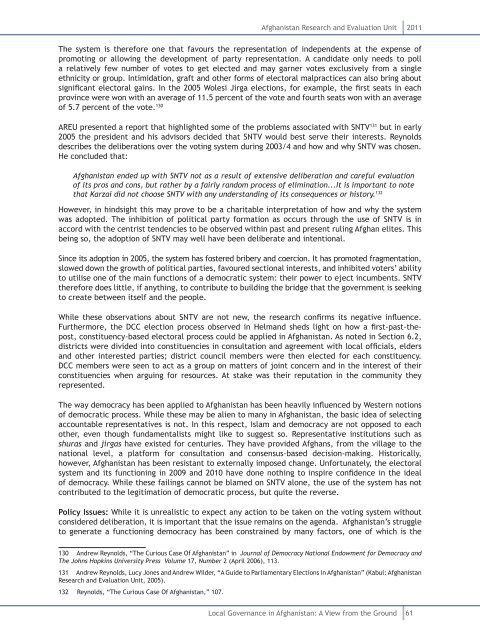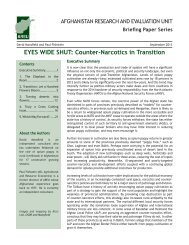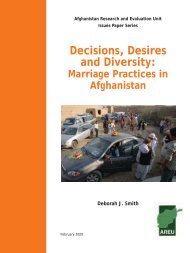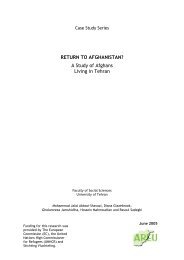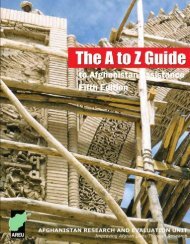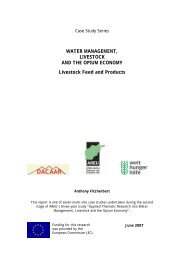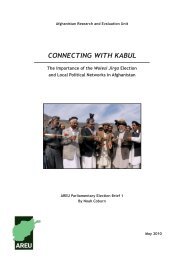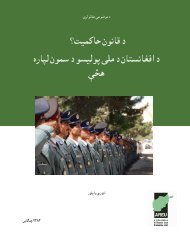Local Governance in Afghanistan: A View from the Ground
Local Governance in Afghanistan: A View from the Ground
Local Governance in Afghanistan: A View from the Ground
- No tags were found...
Create successful ePaper yourself
Turn your PDF publications into a flip-book with our unique Google optimized e-Paper software.
<strong>Afghanistan</strong> Research and Evaluation Unit<br />
2011<br />
The system is <strong>the</strong>refore one that favours <strong>the</strong> representation of <strong>in</strong>dependents at <strong>the</strong> expense of<br />
promot<strong>in</strong>g or allow<strong>in</strong>g <strong>the</strong> development of party representation. A candidate only needs to poll<br />
a relatively few number of votes to get elected and may garner votes exclusively <strong>from</strong> a s<strong>in</strong>gle<br />
ethnicity or group. Intimidation, graft and o<strong>the</strong>r forms of electoral malpractices can also br<strong>in</strong>g about<br />
significant electoral ga<strong>in</strong>s. In <strong>the</strong> 2005 Wolesi Jirga elections, for example, <strong>the</strong> first seats <strong>in</strong> each<br />
prov<strong>in</strong>ce were won with an average of 11.5 percent of <strong>the</strong> vote and fourth seats won with an average<br />
of 5.7 percent of <strong>the</strong> vote. 130<br />
AREU presented a report that highlighted some of <strong>the</strong> problems associated with SNTV 131 but <strong>in</strong> early<br />
2005 <strong>the</strong> president and his advisors decided that SNTV would best serve <strong>the</strong>ir <strong>in</strong>terests. Reynolds<br />
describes <strong>the</strong> deliberations over <strong>the</strong> vot<strong>in</strong>g system dur<strong>in</strong>g 2003/4 and how and why SNTV was chosen.<br />
He concluded that:<br />
<strong>Afghanistan</strong> ended up with SNTV not as a result of extensive deliberation and careful evaluation<br />
of its pros and cons, but ra<strong>the</strong>r by a fairly random process of elim<strong>in</strong>ation...It is important to note<br />
that Karzai did not choose SNTV with any understand<strong>in</strong>g of its consequences or history. 132<br />
However, <strong>in</strong> h<strong>in</strong>dsight this may prove to be a charitable <strong>in</strong>terpretation of how and why <strong>the</strong> system<br />
was adopted. The <strong>in</strong>hibition of political party formation as occurs through <strong>the</strong> use of SNTV is <strong>in</strong><br />
accord with <strong>the</strong> centrist tendencies to be observed with<strong>in</strong> past and present rul<strong>in</strong>g Afghan elites. This<br />
be<strong>in</strong>g so, <strong>the</strong> adoption of SNTV may well have been deliberate and <strong>in</strong>tentional.<br />
S<strong>in</strong>ce its adoption <strong>in</strong> 2005, <strong>the</strong> system has fostered bribery and coercion. It has promoted fragmentation,<br />
slowed down <strong>the</strong> growth of political parties, favoured sectional <strong>in</strong>terests, and <strong>in</strong>hibited voters’ ability<br />
to utilise one of <strong>the</strong> ma<strong>in</strong> functions of a democratic system: <strong>the</strong>ir power to eject <strong>in</strong>cumbents. SNTV<br />
<strong>the</strong>refore does little, if anyth<strong>in</strong>g, to contribute to build<strong>in</strong>g <strong>the</strong> bridge that <strong>the</strong> government is seek<strong>in</strong>g<br />
to create between itself and <strong>the</strong> people.<br />
While <strong>the</strong>se observations about SNTV are not new, <strong>the</strong> research confirms its negative <strong>in</strong>fluence.<br />
Fur<strong>the</strong>rmore, <strong>the</strong> DCC election process observed <strong>in</strong> Helmand sheds light on how a first-past-<strong>the</strong>post,<br />
constituency-based electoral process could be applied <strong>in</strong> <strong>Afghanistan</strong>. As noted <strong>in</strong> Section 6.2,<br />
districts were divided <strong>in</strong>to constituencies <strong>in</strong> consultation and agreement with local officials, elders<br />
and o<strong>the</strong>r <strong>in</strong>terested parties; district council members were <strong>the</strong>n elected for each constituency.<br />
DCC members were seen to act as a group on matters of jo<strong>in</strong>t concern and <strong>in</strong> <strong>the</strong> <strong>in</strong>terest of <strong>the</strong>ir<br />
constituencies when argu<strong>in</strong>g for resources. At stake was <strong>the</strong>ir reputation <strong>in</strong> <strong>the</strong> community <strong>the</strong>y<br />
represented.<br />
The way democracy has been applied to <strong>Afghanistan</strong> has been heavily <strong>in</strong>fluenced by Western notions<br />
of democratic process. While <strong>the</strong>se may be alien to many <strong>in</strong> <strong>Afghanistan</strong>, <strong>the</strong> basic idea of select<strong>in</strong>g<br />
accountable representatives is not. In this respect, Islam and democracy are not opposed to each<br />
o<strong>the</strong>r, even though fundamentalists might like to suggest so. Representative <strong>in</strong>stitutions such as<br />
shuras and jirgas have existed for centuries. They have provided Afghans, <strong>from</strong> <strong>the</strong> village to <strong>the</strong><br />
national level, a platform for consultation and consensus-based decision-mak<strong>in</strong>g. Historically,<br />
however, <strong>Afghanistan</strong> has been resistant to externally imposed change. Unfortunately, <strong>the</strong> electoral<br />
system and its function<strong>in</strong>g <strong>in</strong> 2009 and 2010 have done noth<strong>in</strong>g to <strong>in</strong>spire confidence <strong>in</strong> <strong>the</strong> ideal<br />
of democracy. While <strong>the</strong>se fail<strong>in</strong>gs cannot be blamed on SNTV alone, <strong>the</strong> use of <strong>the</strong> system has not<br />
contributed to <strong>the</strong> legitimation of democratic process, but quite <strong>the</strong> reverse.<br />
Policy Issues: While it is unrealistic to expect any action to be taken on <strong>the</strong> vot<strong>in</strong>g system without<br />
considered deliberation, it is important that <strong>the</strong> issue rema<strong>in</strong>s on <strong>the</strong> agenda. <strong>Afghanistan</strong>’s struggle<br />
to generate a function<strong>in</strong>g democracy has been constra<strong>in</strong>ed by many factors, one of which is <strong>the</strong><br />
130 Andrew Reynolds, “The Curious Case Of <strong>Afghanistan</strong>” <strong>in</strong> Journal of Democracy National Endowment for Democracy and<br />
The Johns Hopk<strong>in</strong>s University Press Volume 17, Number 2 (April 2006), 113.<br />
131 Andrew Reynolds, Lucy Jones and Andrew Wilder, “A Guide to Parliamentary Elections <strong>in</strong> <strong>Afghanistan</strong>” (Kabul: <strong>Afghanistan</strong><br />
Research and Evaluation Unit, 2005).<br />
132 Reynolds, “The Curious Case Of <strong>Afghanistan</strong>,” 107.<br />
<strong>Local</strong> <strong>Governance</strong> <strong>in</strong> <strong>Afghanistan</strong>: A <strong>View</strong> <strong>from</strong> <strong>the</strong> <strong>Ground</strong><br />
61


